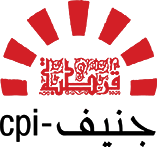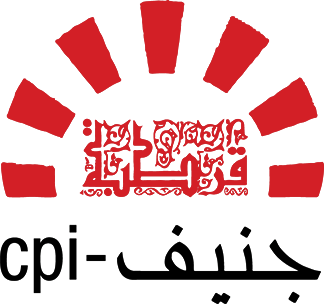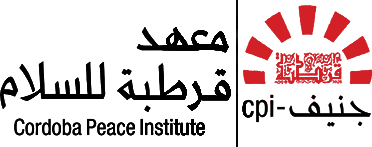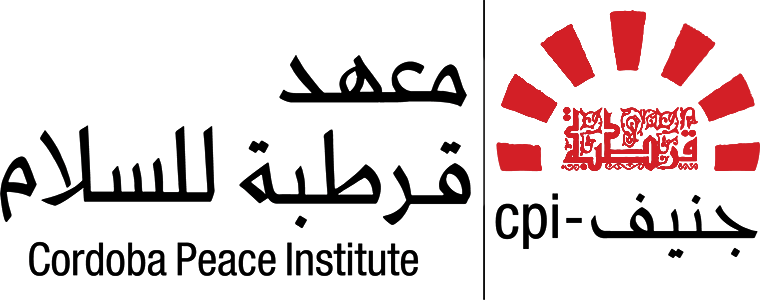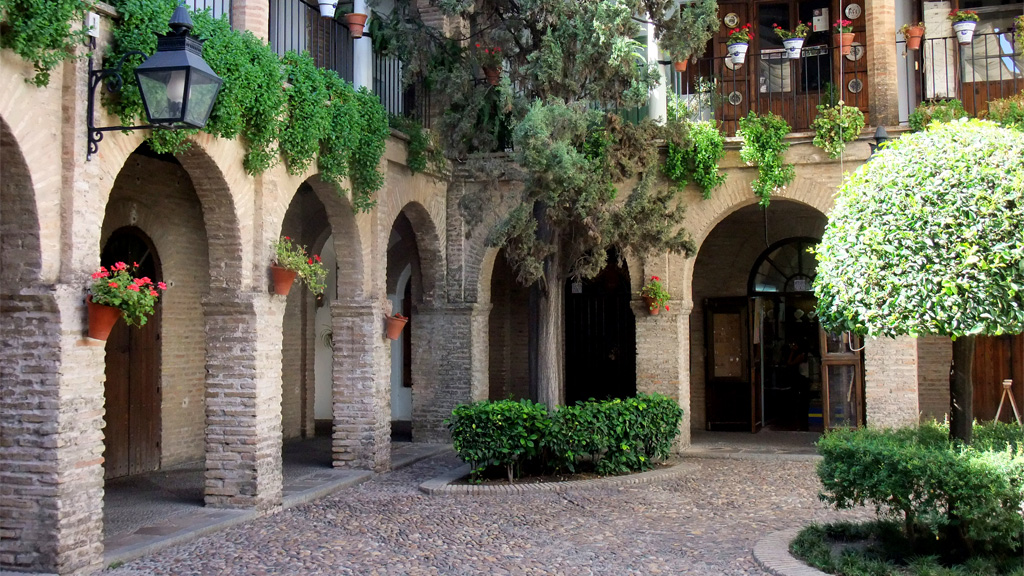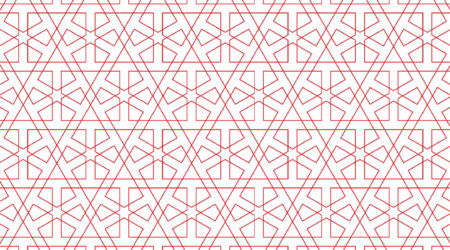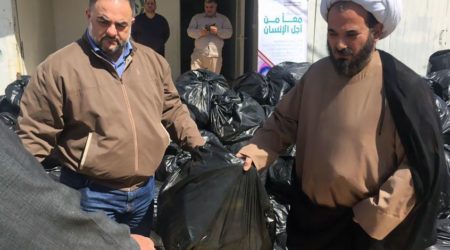The Cordoba Update 11/2017
|
The bi-weekly CORDOBA UPDATE is the product of continuous monitoring work, carried out by the Cordoba Foundation of Geneva team. By analysing and reporting on key events and trends in the Foundation’s areas of interest, we aim to draw readers’ attention to pertinent developments in North Africa, the Sahel, West Asia and Europe, which are not always covered in ‘mainstream’ media. In addition to sharing news from these four regions, the Cordoba Update is an opportunity for the Foundation to provide regular updates on its publications, events and other developments. In line with the programmes and projects funded by partners of the Cordoba Foundation of Geneva, updates and information are included under the following themes:
For questions and/or feedback regarding the content and form of the Cordoba Update, please contact Sarah Franck: sarah.franck@cordoue.ch Le CORDOBA UPDATE est un bimensuel qui présente le travail continu de suivi réalisé par l’équipe de la Fondation Cordoue de Genève. Par l’analyse des événements et tendances qui concernent les domaines d’intérêt de la Fondation, nous visons à attirer l’attention de nos lecteurs sur les développements pertinents en Afrique du Nord, dans le Sahel, en Asie de l’Ouest et en Europe, une actualité qui n’est pas toujours couverte dans les médias dits ‘traditionnels’. Outre le partage de l’actualité de ces quatre régions, le « Cordoba Update » est un moyen pour la Fondation de fournir des mises à jour régulières sur ses publications, événements et autres développements. En accord avec les programmes et projets financés par les partenaires de la Fondation Cordoue de Genève, les mises à jour et informations concernent les thèmes suivants :
Pour des questions et / ou des commentaires concernant le contenu et la forme du Cordoba Update, veuillez contacter Sarah Franck : sarah.franck@cordoue.ch |
TRANSITION AND POLITICAL PARTICIPATION / TRANSITION ET PARTICIPATION POLITIQUE
Egypt & EU, 14.06.17: How Europe Can Avoid Another Crisis in Egypt
Yasser El-Shimy & Anthony Dworkin have written a new policy brief for the European Council on Foreign Relations on Egypt-EU relations. They argued that Europe’s current policy towards Egypt is dominated by immediate migration concerns and commercial opportunities. But this short-sighted approach offers few benefits and overlooks the dangers of Egypt’s current direction. They added that the security situation in Egypt is worsening, with terrorist groups extending their reach and launching a wave of attacks against Coptic Christians. At the same time, the political crackdown has intensified, driving some young Islamists towards violence as peaceful avenues for political expression are shut down. According to the study, while Sisi has engaged in long overdue economic reforms, deeper and more structural change is needed to offer Egyptians opportunity and raise their standard of living. They concluded that the EU should do away with its narrow approach of working with Egypt only on areas of mutual interest. It should also promote the rule of law, economic opportunities, more effective security, and political rights in Egypt. To do so, the EU should prioritize Egypt’s socio-economic development, refocusing the counter-terrorism debate, and limiting the worst excesses of the political crackdown. Based on the study, “European governments should indeed be interested in stability and institutional resilience, but those go hand in hand with respect for the rule of law, social justice, economic opportunities, and political rights. As it is, the Egyptian situation contains inherent risks of instability. The high level of political repression is not accompanied by economic discipline, and monetary and fiscal reforms are not accompanied by any genuine structural reforms to limit corruption, and promote transparency and good governance. Without such reforms, aid alone is unlikely to lead to sustainable economic growth.”
Tom Stevenson wrote on challenges that Egypt faces under Sissi’s regime. He asserted “what Egypt is doing in Sinai and elsewhere is fostering and encouraging terror, rather than countering it.” He added that more than 22 million Egyptians live in poverty, and the general population’s quality of life compares poorly with Egypt’s North African and Middle Eastern neighbors. Since 2011, there has been a nearly 50 percent increase in the number of official penitentiary prisons in Egypt. Meanwhile, Maged Mandour wrote that the Egyptian regime is moving decisively to close what remains of public space, dominating all aspects of political life for decades to come.
Links for more information:
http://www.ecfr.eu/publications/summary/egypt_on_the_edge_how_europe_can_avoid_another_crisis_in_egypt
https://www.opendemocracy.net/north-africa-west-asia/maged-mandour/laying-foundations-for-totalitarian-state
http://www.worldpoliticsreview.com/articles/22466/sissi-s-egypt-is-falling-apart-will-it-explode
Egypt, 08.06.17: The Army Feeds Social Stability in Egypt
Zeinab Abul-Magd, an associate professor at Oberlin College, USA, wrote that Egypt’s military is using food charity during Ramadan to prevent social unrest, though she argued that it may not be able to afford this tactic in the long term. This Ramadan, the Egyptian army is charitably distributing millions of food boxes in poor urban and rural areas across the country. Once distributed for free, the boxes are for the first time this Ramadan being sold for 25 Egyptian pounds ($1.40), much lower than their market price of 87 pounds ($4.80), even after being substantially subsidized by Tahya Misr. Since it has eliminated or fundamentally weakened other civilian rivals in the state, the Egyptian military regime currently relies on food donations to avoid social unrest. Sisi’s own neoliberalism, marked by obtaining a loan from the World Bank in 2015 and another from the IMF in 2016, required the military regime to finish what Mubarak started by drastically reducing food, gas, electricity, and medical subsidies. Interestingly, other security apparatuses, namely the General Intelligence Directorate and the Ministry of Interior, are also trying to connect with society and seek some public support through Ramadan food charity, putting themselves in direct competition with the military. The army’s use of food charity to prevent social unrest especially targets areas that witnessed intense workers’ protests before and after 2011, such as the city of Mahalla, which has a large public-sector textile plant. As it seems highly unlikely that Egypt’s economic conditions will improve soon, the military institution will likely not be able to afford to continue such costly charity across the country. This may affect political stability and security in the long run, for if hunger riots erupt, the military might resort to the same tool it used to contain widespread protests in 2011: brutal violence against the discontented masses.
Meanwhile, Egyptian authorities in recent weeks have arrested at least 50 peaceful political activists, blocked at least 62 websites, and opened a criminal prosecution against a former presidential candidate, Human Rights Watch reported on June 15. These actions are further closing any remaining space for free expression.
Links for more information:
http://carnegieendowment.org/sada/71198
https://www.hrw.org/news/2017/06/15/egypt-intensifying-repression-basic-freedoms
https://www.amnesty.org/en/latest/news/2017/06/dozens-of-news-sites-blocked
Lebanon, 14.06.17: Agreement on a new electoral law
Last Friday, June 16, 2017, the Lebanese Parliament ratified the new draft electoral law passed by the Cabinet two days earlier, overriding sharp criticism and reservations by some blocs. With terms still limited to four years, the country will now be divided into 15 major electoral districts, made up of 27 sub-districts with the 128 MPs divided among them. The biggest outcome of the new law is the transition from a plurinominal majority system, the so-called “winner-takes-all” system, to a proportional system for the first time since Lebanon officially gained its independence in 1943.
Some observers see in this new law the second victory of Hezbollah after the election of Mr. M. Aoun as President. Hezbollah and the Amal Movement were the strongest supporters of a total proportionality system. Prime Minister S. Hariri and his movement, the Future Movement, as well as the Progressive Socialist Party of Mr. W. Jumblatt are seen as disadvantaged by the new law.
While there is a general agreement that this law will not bring any substantial change in the political system, the proportional system might enable new political actors to enter Parliament, and thus enhance representativeness, although without a chance to balance the old political elite. Many of those interviewed by The Daily Star complained that the amendments to the vote law would be insignificant as long as the established political parties maintained the majority of power. They called for parties like Beirut Madinati, a civil society group that stood in last year’s municipal elections, to come forward in parliamentary elections scheduled for spring next year.
Following the ratification of the law, PM S. Hariri and Speaker of the Parliament N. Berri announced the postponement of the election to Spring 2018, a postponement said to be necessary for the preparation of the new magnetic electoral cards. This announcement provoked protests by civil society movements that were violently repressed on Friday in front of the Parliament, the protesters said.
It should be noted that there has been no agreement on the introduction of key reform proposals such as lowering the voting age from 21 to 18 and the establishment of a women’s quota. With regard to the failure to introduce such reforms, Khaled, a taxi driver from Mazraa, believes, as reported by The Daily Star, “the reason [Cabinet] didn’t lower the voting age to 18 is because this is the generation that has lived through the garbage crisis … because they are the generation born under the government’s disgusting mismanagement and they are tired of [the government] just like they are tired of the smell of garbage and the sight of Costa Brava [landfill],” he said. “If you can go into military school at 17, why should you not be able to vote?”
Links for further information:
https://en.wikipedia.org/wiki/Lebanese_general_election
http://almanar.com.lb/2177349
https://www.dailystar.com.lb/News/Lebanon-News/2017/Jun-12/409360-lebanon-enters-make-or-break-week
https://www.lorientlejour.com/article/1057903/la-loi-electorale-et-le-changement-du-paysage-politique
http://www.lemonde.fr/proche-orient/article/2017/06/17/au-liban-l-adoption-d-une-nouvelle-loi-electorale
http://www.middleeasteye.net/news/least-seven-injured-lebanese-protesters-beaten-security-personnel
http://www.al-monitor.com/pulse/originals/2017/05/lebanon-civil-movement-parliament-extension-protest
RELATIONS BETWEEN COMMUNITIES OF DIFFERENT ETHNIC, CULTURAL AND RELIGIOUS AFFILIATIONS /
RELATIONS ENTRE COMMUNAUTÉS DE DIFFÉRENTES AFFILIATIONS ETHNIQUES, CULTURELLES ET RELIGIEUSES
Bahrain, 23.05.17 – 18.06.17: Growing Challenges for Bahrain and Tightening Security in the Gulf and at Home
Bahrain has been at the centre of a growing region-wide controversy over the severance of diplomatic ties and the imposition of an embargo on its neighbour, Qatar. The embargo has so far included revoking Qatar Airways’ operating license, banning the prominent news channel Al Jazeera, and expelling Qatari citizens from Bahrain. In tandem with its larger neighbours, Bahrain has also introduced a number of domestic measures as part of the regional blockade on Qatar. According to Al Araby Al Jadeed, Bahrain’s Interior Ministry announced its decision to jail any citizen “who expresses sympathy for Qatar over sanctions and a blockade imposed by its Gulf neighbours,” following a similar step taken by the United Arab Emirates. The decision has already resulted in two arrests, reported on 14 June, including the detention of Issa Faraj Arhama al-Burshaid, a prominent human rights lawyer who “launched a lawsuit against the country’s government over its role” in the blockade, while a second Bahraini citizen was jailed for comments made on the issue, on social media.
Bahrain’s interests in the diplomatic spat are linked to its recent demand for Qatar to cut its ties with Iran, who the government has accused of supporting terrorist activities, mostly among the majority Shia population, since 2011. The government’s security concerns have been the rationale behind a number of escalating measures against unrest in the country, including the shooting of five protestors by Bahraini police in Diraz, on 23 May. In the aftermath of those deaths, the government made some 268 arrests, while the Interior Ministry warned that security forces will “‘challenge, in accordance with the law, any gathering or incitement to protest.” However, the intensification of the crackdown on dissident protestors in Bahrain has not been successful in stemming the violence and, according to the Bahrain News Agency, one policeman was killed and two others injured in a bomb blast in Diraz, on 18 June. Furthermore, on 15 June, the reported sentencing of a Bahraini national for alleged membership of a group with ties to the so-called Islamic State raises concerns about increasing polarisation of the small population, and greater reliance on violence to express political views.
In further actions, on 1 June, Bahraini authorities ordered the closure of the principal secular opposition group – the National Democratic Action Society, or Waad. The decision was taken on the case filed by the Ministry of Justice against the opposition group in March 2017, when it accused the group of supporting terrorism and sanctioning violence, describing Waad as having “glorified as ‘martyrs’ the men convicted of killing three police officers in a 2014 bomb attack.” Another entity that has come under Bahraini government scrutiny is the nation’s independent Al-Wasat newspaper. On 4 June, the newspaper was suspended on charges of “repeating the publication of … that which spreads divisions in society and affects the Kingdom of Bahrain (vis a vis) other countries,” apparently referring to an article detailing popular protests in the northern Rif region of Morocco.
The escalation in legal action against Bahraini organisations and citizens that are critical of the government, and the use of force against protestors and activists in the country, has been met with words of caution from observers including United Nations human rights investigators. In a joint statement, five investigators cautioned that “trying to quell protests and criticism by resorting to repression and violence is not only a violation of international human rights law, it also undoubtedly leads to an escalation of tension,” further noting that “we fear that this increasingly hostile environment is undermining any prospect of alleviation of social and political unrest in Bahrain.”
Links for more information:
https://www.alaraby.co.uk/english/news/2017/6/8/bahrain-follows-uae-and-promises-jail-for-qatar-sympathisers
https://www.alaraby.co.uk/english/news/2017/6/14/bahrain-rights-lawyer-arrested-over-qatar-blockade-lawsuit
http://www.bna.bh/portal/en/news/790292
http://www.middleeasteye.net/news/bahrain-police-open-fire-sit-shia-clerics-supporters
https://www.alaraby.co.uk/english/news/2017/5/24/bahrain-sends-warning-to-protesters-after-five-shot-dead
http://www.bna.bh/portal/en/news/790745
https://www.middleeastmonitor.com/20170618-blast-kills-policeman-in-village-of-bahraini-shiite-cleric
http://www.bna.bh/portal/en/news/790428
https://www.alaraby.co.uk/english/news/2017/6/1/bahrain-bans-main-secular-opposition-group
http://www.middleeasteye.net/news/bahrain-indefinitely-suspends-independent-newspaper
https://www.middleeastmonitor.com/20170617-un-experts-warn-repression-in-bahrain-will-breed-unrest
Iraq, 21.05.17 – 13.06.17: The Future of Relations between the Iraqi Government and its Christian and Sunni Arab Minorities
In the ongoing conflict between the Iraqi state, its militias and its foreign allies against the so-called Islamic State, some actors are voicing growing concerns for the future of relations between the central government and some parts of the population. The Islamic State group, which has been in control of large portions of the country’s territory since 2014, has exacted a huge cost from numerous ethnic and religious communities in Iraq.
Following demands for greater autonomy and internationally-sponsored security for Ninevah Province, returnees from the region’s Christian communities are demanding government assistance in reconstructing several important monasteries and churches that were destroyed by the Islamic State group. The monastery of Mar Behnam, which was erected in the fourth century, and the Mar Mattai Monastery which is over 1,600 years old, were both occupied by the Islamic State group in 2014. Mar Behnam was subsequently destroyed by the armed group in 2015. According to one Christian parliamentarian, Yonadam Kanna, Iraqi security forces and local volunteers have already begun the process of removing graffiti “inciting the killing and displacement of Christians” on the walls of Mar Behnam monastery, while parts of the monastery that were used as prison cells are being renovated. However, Kanna highlighted that some 40% of these two historic sites have been destroyed by the Islamic State group, requiring “government support and funding to turn these sites again into places of worship and religious tourism centres.”
Some have called the demands premature, given that the conflict against the so-called Islamic State is still ongoing. One representative of the Christian Waqf Foundation highlighted that, before reconstruction efforts can begin, the Iraqi government must “restore confidence in the hearts of the Christians… by focusing on strengthening security in the Ninevah Plains and reassuring the population that the state is strong and that terrorist and extremist organizations will no longer return to the region.” The question of restoring sites of historic and religious significance in Iraq is yet another example of the scope of reconstruction work that will be required in coming years.
Further concerns have been raised as to the potential future for Iraqi families that have been accused of connections with the Islamic State group. Two recent articles have described the conditions of some 170 families currently based in Shahama camp, on the outskirts of Tikrit – one of the few camps for displaced persons that belong to the family of members of the Islamic State group. According to one foreign correspondent however, Shahama is unofficially a detention centre for people that the Iraqi army has judged “guilty by association, without the involvement of a single court or judge.” While the security forces have described the internment measures in operation at Shahama as necessary to protect the wider community, there have been concerns over revenge attacks against these vulnerable families. Phones are prohibited in Shahama camp, meaning that families are unable to discover any news of their loved ones and unable to report on their own conditions. The camp has limited facilities for education and for income generation, and the financial crisis facing many families has apparently led to a growth in prostitution and drug abuse. Other Iraqis with connections to the armed group are currently living in camps near Mosul, Tikrit and Fallujah, reportedly under similar conditions.
According to one Iraqi journalist, Iraqi families with connections to the so-called Islamic State are best described “as outcasts” and “social pariahs.” Although the United Nations High Commissioner for Refugees reported that 120 families have been permitted to leave Shahama camp, their status does not seem set to change for the better in the immediate future. The dangers facing these families is indicated by the decision taken by the provincial council of Salahaddin, in August 2016, when the council agreed to expel families affiliated to the Islamic State group, prohibiting them from returning to their homes within a decade. Although the decision has not been officially implemented, due to a backlash from international human rights groups and the United Nations Mission in Iraq, it could be indicative of a trend towards the collective punishment of some Sunni Arab families in parts of the country.
Links for more information:
http://www.al-monitor.com/pulse/originals/2017/05/iraq-christians
http://www.niqash.org/en/articles/security/5593/Visiting-The-Camp
http://reliefweb.int/report/iraq/mosul-weekly-protection-update-3-9-june-2017
http://www.al-monitor.com/pulse/originals/2017/06/iraq-isis-families-shahama-camp
Mali, 19.06.17: Affrontements meurtriers entre Peuls et Dogons au centre du Mali
Des affrontements meurtriers ont éclaté, le 17 juin, entre des éleveurs peuls et des chasseurs dogons au centre du Mali. Les rixes se sont déroulées autour de la localité de Dioungani, dans le cercle de Koro, région de Mopti. Il y aurait eu 32 morts selon Adama Coulibaly, préfet de Koro. Des renforts venus de Douenza et Mopti ne sont arrivés que deux jours après le début des violences, la zone étant difficile d’accès car située à la frontière du Burkina Faso, où l’Etat est peu présent et où sévissent des groupes dits « terroristes ».
Selon les informations recueillies sur place, les violences auraient été déclenchées par l’assassinat d’un chasseur et d’un commerçant dogons par des jeunes peuls, présumés « jihadistes ». En réaction, les villageois dogons ont mené des représailles contre le village peul voisin, puis les peuls ont ensuite à leur tour répliqué en attaquant les dogons..
Les tensions entre dogons, essentiellement sédentaires, et peuls, à majorité nomade, sont récurrentes, surtout au moment de l’hivernage et souvent pour des questions foncières, liées aux champs et à la transhumance. Seulement, depuis 2012, la présence de groupes armés violents à référentiel religieux aurait exacerbé la suspicion et la stigmatisation entre les communautés : certains dogons accusent les peuls de proximité voire d’appartenance aux groupes armés violents, tandis que certains peuls reprochent aux dogons d’aider l’armée malienne à les pourchasser et à les persécuter, indistinctement. Les affrontements sont par ailleurs de plus en plus meurtriers, notamment en raison du fait que les armes automatiques pullulent désormais dans la région, remplaçant ainsi les armes dites « traditionnelles ».
Liens pour plus d’informations :
http://www.rfi.fr/afrique/20170620-affrontements-peuls-dogons
http://www.maliweb.net/societe/affrontements-entre-peuls-dogons-centre-mali-2338922.html
http://sahelien.com/blog/mali-plus-dune-dizaine-de-morts-dans-des-affrontements-communautaires
http://www.jeuneafrique.com/449583/politique/mali-trentaine-de-morts-violences-entre-peuls-dogons
VIOLENT EXTREMISM AND THE WAR ON TERROR / EXTRÉMISME VIOLENT ET LA GUERRE CONTRE LA TERREUR
UK, US and Cross-regional, 12.06.17: War on Terror, Elections and Colonial Past
According to Aljazeera’s report on the recent UK elections, the British media very rarely talks about the underlying causes of terrorism; it is a very strong taboo within the media. British Prime Minister Theresa May’s campaign was showing signs of stumbling before the Manchester and London attacks which pushed domestic security to the top of the agenda. That is a scenario, when fear is in the air, in which conservative parties such as May’s tend to do well. But, for some reason, that didn’t happen this time. Instead Jeremy Corbyn’s Labour Party surged, with him saying aloud what many believe but few western politicians dare to say, that it’s time for a total rethink on the so-called “war on terror”. For Corbyn, Britain’s foreign policy and intervention in wars abroad had fuelled the threat of “terrorism” at home.
Recently, Lubomír Zaorálek, the Czech foreign minister and likely Social Democrat candidate for prime minister in the October elections, argued that an awakening in the Muslim world about the atrocities committed in the west’s colonial past is feeding contemporary radicalization of communities. In his speech, on Wednesday, 14 June 2017, Zaorálek said nations including Britain, France, the Netherlands, Belgium, the US, the Russian empire and its Soviet successor had been responsible for the deaths of millions.
In the US, retired US Army Major General Paul Vallely, said even with the defeat of ISIS, the war on terror will go on. In fact, the U.S. is opening a new theater of war on terror, joining the Philippines’ fight against ISIS-linked militants. This move comes one day after 13 Philippine marines were killed in the Marawi battle and follows “very friendly” conversations between President Trump and controversial Philippine President Rodrigo Duterte, who has encouraged extrajudicial killings of suspected drug dealers.
According to Piers Robinson, Chair in Politics, Society and Political Journalism at the Department of Journalism Studies, University of Sheffield, “Ritual condemnations will not help to address how interwoven terror has become with western foreign policy objectives. It is time to reflect more deeply on the roots of terrorism.” He added, “From the start, the so-called ‘war on terror’ – sold to western publics as a war against terrorism – was just as much, if not more, about geostrategic opportunism and initiating aggressive wars.”
Links for more information:
http://www.aljazeera.com/programmes/listeningpost/2017/06/war-terror-coverage-affected-uk-vote
http://www.aljazeera.com/news/2017/05/corbyn-admit-war-terror-working
https://www.theguardian.com/world/2017/jun/15/growing-awareness-of-colonial-past-fuels-radicalisation
https://www.rt.com/shows/sophieco/390933-isis-syria-iraq-europe/
http://theweek.com/speedreads/704993/opens-new-theater-war-terror-joining-philippines
https://www.opendemocracy.net/piers-robinson/after-london-bridge-attack-war-on-terror
Cameroun, 19.06.17: Attaques meurtrières de Boko Haram à l’extrême nord
Deux civils ont été tués, le 19 juin 2017 au soir, dans un attentat-suicide perpétré dans l’Extrême-Nord du Cameroun. Cette région est devenue, selon les services de sécurité camerounais, un théâtre d’attaques fréquentes commises par le groupe violent à référence religieuse, Boko Haram.
La région de l’Extrême-Nord Cameroun est confrontée, depuis plusieurs semaines, à une résurgence d’attaques de Boko Haram, après des mois de relative accalmie. Dans la nuit du 9 au 10 juin, un militaire a été tué dans un autre attentat à Kolofata, à 10 km au sud-ouest de Limani. Début juin, neuf civils avaient péri dans un double attentat-suicide dans la même ville.
Par ailleurs, le 18 juin, au matin, un membre du comité de vigilance (groupe d’autodéfense) de Sanda-Wadjiri, une petite localité de la région, a été tué par des militaires en patrouille militaire qui aurait commis une erreur. Celle-ci a fait également neuf blessés, selon une source proche des services de sécurité. D’après certaines sources locales, les militaires nouvellement déployés dans la zone croyaient avoir à faire à des « jihadistes ».Ces comités de vigilance, formés de citoyens, sont chargés de prévenir les forces de sécurité de tout mouvement suspect pour limiter les attaques et attentats commis par Boko Haram.
Liens pour plus d’informations :
http://www.cameroun24.net/blog/?pg=actu&ppg=0&pp=&id=39720
http://www.cameroon-info.net/article/cameroun-kolofata-onze-morts-dans-une-nouvelle-attaque-kamikaze
http://www.cameroun24.net/blog/?pg=actu&pppg=Lutte%20contre%20Boko%20Haram
http://koaci.com/search-Boko%20Haram.html
http://www.jeuneafrique.com/444562/politique/cameroun-7-civils-tues-double-attentat-lextreme-nord-pays
Mali, 18.06.17: Attaque terroriste contre un centre de tourisme à Bamako
Dimanche 18 juin 2017 cinq personnes, trois civils et deux militaires, ont péri dans une attaque prêtée par des groupes violents. Elle visait des étrangers dans un centre hôtelier, le Campement Kangaba, situé en périphérie de Bamako.
C’est vers 16H, qu’un groupe d’hommes armés, venus à bord de plusieurs motos, a commencé à tirer, sans distinction, sur les occidentaux qui se trouvaient dans le complexe. Des militaires membres de la force européenne déployée au Mali qui se trouvaient en vacances sur les lieux, ont riposté, déstabilisant les assaillants. Une intervention des forces spéciales maliennes « Forsat », mises en place après une attaque similaire, le 20 novembre 2015, contre le Radisson Blu de Bamako, a été rapidement mise en place. Quatre assaillants ont été tués et 5 suspects arrêtés.
Trois jours plus tard, un communiqué du Groupe de soutien aux Musulmans et à l’Islam (GSMI), conglomérat de groupes armés religieux violents, proche d’Al Qaida, dirigé par Iyad Ag Ghali, a revendiqué l’opération. Cette attaque, révèle combien la situation sécuritaire est précaire partout au Mali, y compris à Bamako. Les observateurs notent avec satisfaction que les forces spéciales maliennes ont été assez rapides à intervenir et ont rapidement maîtrisé la situation, contrairement à ce qui s’était passé à l’hôtel Radisson Blu en 2015.
Liens pour plus d’informations :
http://www.lepoint.fr/monde/mali-attaque-contre-un-campement-touristique-a-bamako-frequente-par-des-occidentaux
http://www.lemonde.fr/afrique/article/2017/06/18/mali-attaque-contre-un-lieu-de-villegiature-pres-de-bamako
http://www.jeuneafrique.com/449076/politique/attaque-terroriste-mali-aurait-pu-etre-carnage
http://www.leparisien.fr/international/mali-attaque-dans-un-lieu-frequente-par-des-occidentaux-pres-de-bamako
New York, 21.06.17: Le Conseil de sécurité de l’ONU adopte une version édulcorée de la résolution portant déploiement de la force du G5 Sahel de lutte contre le terrorisme
Une dépêche du service d’information de l’ONU daté du 21 juin 2017, annonce l’adoption à l’unanimité par le Conseil de sécurité de l’ONU d’une résolution dans laquelle ce dernier se félicite du déploiement de la Force conjointe du G5 Sahel (FC-G5S) sur l’ensemble du territoire des pays qui y participent. Cette dépêche stipule que les effectifs en personnel militaire et personnel de police pourraient aller jusqu’à 5.000 personnes, dans le but de rétablir la paix et la sécurité dans la région du Sahel. Ce vote intervient après d’âpres négociations au Conseil de sécurité surtout avec la réticence de Washington sur le financement et l’efficacité de cette force dans la lutte contre l’usage extrême de la violence dans la région.
Avec ce vote, la force G5 Sahel pourra se déployer sur le terrain sous la direction de Didier Dacko, Général de division de nationalité malienne. Le mode opératoire n’est pas encore connu. Toutefois, un sommet extraordinaire du G5 Sahel se tiendra le 2 juillet prochain à Bamako.
Pour rappel, le G5 Sahel, créé en 2014 et qui inclut le Burkina Faso, le Mali, la Mauritanie, le Niger et le Tchad, avait adopté une résolution, le 6 février 2017, dans laquelle il a décidé de créer une force conjointe. Par un communiqué du 13 avril 2017, le Conseil de paix et de sécurité de l’Union africaine a entériné le concept stratégique des opérations et autorisé le déploiement de la FC G5S.
Liens pour plus d’informations :
http://www.agenceecofin.com/securite/2206-48298-le-deploiement-de-la-force-g5-sahel-adopte-par-le-conseil-de-securite
http://www.un.org/apps/newsFr/storyF.asp?NewsID=39704
http://www.jeuneafrique.com/449801/politique/conseil-de-securite-de-lonu-va-voter-soutien-a-force-africaine-anti-jihadiste
http://www.journaldumali.com/2017/06/12/g5-sahel-conseil-de-securite-dit-non-projet-de-resolution
http://www.france24.com/fr/20170616-force-antijihadiste-g5-sahel-washington-oppose-une-resolution-onu
The views and perspectives contained in the Weekly Update are from individual contributors and external sources, and do not necessarily reflect the opinions or position of the Cordoba Foundation of Geneva. The links are neither intended as an endorsement of particular publications nor the only source for the updates, but to connect to information in the public domain, for those interested in background or further details.
